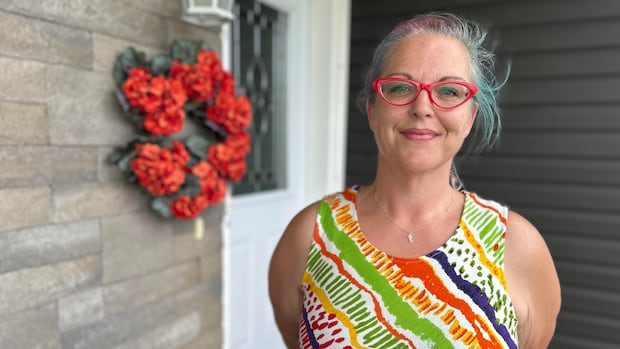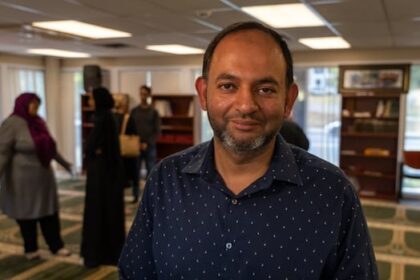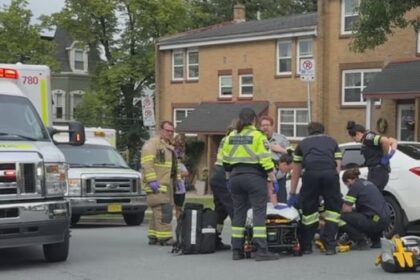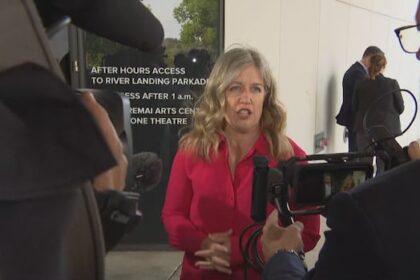Alison Orr describes herself as a natural teacher. With a bachelor of arts, and years of experience as a registered massage therapist and instructor at Eastern College, she says she has a “natural ability to explain things to people.”But she’s not a certified teacher. She’s a mother of three who stepped into the school system last year in response to a growing demand for teachers. Orr taught in six different schools last winter in the Woodstock area and calls it a “fabulous” experience. “I was able to teach from kindergarten right up through high school,” she said. “I really enjoyed my time and I did English classes as well as French-language classes. Once the principals knew that I was willing and able to do the gymnasium classes, I did a lot of gym classes as well.”Uncertified teachers are becoming the norm in just about every province in Canada, with teacher shortages now ranging in the thousands. Qualifications can vary, but a bachelor’s degree is preferred. People can apply to the school district for a local teaching permit for short-term work, and substitute positions up to one year. But there’s a growing call for changes to certification guidelines, as the demand for teachers continues to climb.Heidi Ryder, the New Brunswick Teachers’ Association president, expects well over 1,000 teachers and principals in the anglophone school system will retire within five years. (RB Photography)According to the New Brunswick Teachers’ Association, there were more than 1,100 non certified teachers in the anglophone sector last year, who, like Orr, filled in as substitutes on an as-needed basis. There were also 132 non-certified teachers who were hired for contracts in anglophone schools last fall. That number jumped to 180 contracts this September. And those numbers are expected to climb.Heidi Ryder, the president of the teachers’ association, said the most up-to-date numbers project that 1,300 teachers and 157 school principles and vice-principals in the anglophone sector are likely to retire in the next five years.That’s about 25 per cent of teaching positions in the anglophone sector. WATCH | ‘It’s not enough just to say, let’s just hire more teachers,’ professor says:Strict teacher criteria holding back hiringsGovernments across Canada are relying on uncertified teachers to fill a national shortage in the school system. Some say the shortage is an opportunity to get people with a variety of talents and experience, along with an ability to teach others, into the system.Orr said she believes there is a strong, intelligent population of community members who could help the school system as it navigates the teacher shortage that’s swept across the country. But walking into “a completely new environment every single day” can be challenging, and the sporadic staffing and sudden cancellations for permit holders made it difficult to depend on. “There were several times where I had been booked for a job, and I lost that bid on that job less than 24 hours before I was supposed to be in school,” she said, adding that certified teachers are given preference for available jobs.Orr said she wasn’t always left with a lesson plan either, and being shown her classroom her first day was often the extent of the orientation. She suspects such drawbacks contribute to the high number of local permits being issued. “It’s a part-time job, and it’s an on-call job, and they can have those employment opportunities taken away from them, 48 or 24 hours or less prior to starting that shift,” she said. There’s nothing that’s more poorly managed than substitute teaching- Paul Bennett, education consultant Ryder said she is in talks with the government about implementing a modernized teacher certification framework, to better equip those leading classrooms with the essential skills and resources needed.Consultant sees poor managementCBC News requested an interview with Education Minister Claire Johnson but was turned down. Education consultant Paul Bennett, who has been in the field for nearly four decades, said “there’s nothing that’s more poorly managed than substitute teaching and the substitute teaching roles.”Education consultant Paul Bennett says there are highly educated people who could help fill gaps in teaching staff if the province considered a broader range of teaching criteria. (Schoolhouse Consulting)He recommends having a “taxi squad” of substitute teachers on a permanent recall list, so they can establish relationships with the school and principal and “actually do something when they come in.” “Instead of just having this floating pool, first come, first served, they should have much more commitments from them,” adding that most “parachute teachers” are going to have a tough time. Certification is only one factorWith chronic teacher shortages, Bennet said, the province needs to start thinking more broadly about teaching criteria and how “we turn this threat into an opportunity.”“Teachers can be found in the most unlikely places,” he said. “You will potentially find teachers who are now in the university system, who are on part-time contracts and between positions, people who are outstanding in their fields of vocation, who have a talent for teaching others.“You still look at them because they’re prime candidates.”Bennett said for the top academic prospects who have MBAs and doctorates in their subject areas, “the last thing they want to do is go back and take a two-year teaching degree.”Requiring that certification, he said, clouds the issue, and the system risks losing a lot of top-flight talent.Bennett said he is not in favour of “just putting warm bodies in the classroom,” but he does recommend relaxing restrictions for people who are highly trained and highly skilled.Local permits provide a ‘stopgap’ Ted McDonald, a political science professor at the University of New Brunswick, calls the local permits “an escape valve to relieve the pressure on the system.”He did a study last year that found only half of people graduating with a bachelor’s degree in of education in New Brunswick end up teaching here — not enough to keep up with retirements and a growing population. McDonald said untrained teachers can be a short-term “stopgap,” but he emphasized the need to examine requirements more carefully for those teachers moving into contract positions. UNB political science professor Ted McDonald says there are ways to keep more education graduates in New Brunswick, including offering incentives and full-time positions more quickly. (Rob Blanchard/University of New Brunswick)If something more significant is needed, he suggests a more systematic “evaluation of the qualifications necessary and the training that might be provided than is currently in place.”That includes knowing the subject matter, he said, but also how to teach it. He also stressed the importance of trying to keep more education graduates in the province, including through incentive programs and opportunities for teachers to move off the supply list and into a contract more quickly. There are lots of aspects to look at, he said, and not necessarily as an “either or” scenario but rather “all of the above.”“We do have to get creative in how we meet the shortage,” he said. “It’s not enough just to say, ‘Well, let’s just hire more teachers.’”Despite the challenges of being on the local permit list, Orr reflected fondly on her time in the school system with the children who “keep you young” and the teachers who “really appreciated us being there.”“This is why I chose to do substitute teaching,” she said. “To go in and support my friends, to go support our community members that need support.”Orr is now enjoying a full-time position working with seniors. Asked whether she would return to the classroom one day, she said, “I would never want to say never.”
Uncertified teachers an escape valve in the school system











